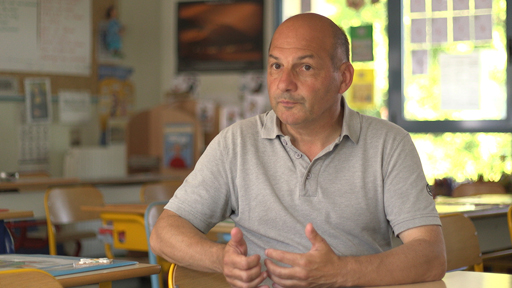7 Using knowledge about languages
In this section, you will meet Yann. You will reflect on how you can use your existing knowledge of French (and perhaps other languages too) to make sense of language you have not yet learned, and to build your vocabulary.
Activity 32

Transcript
Listen to the first 25 seconds of the clip featuring Yann Renard (up to ‘Amboise’). Correct the following summary of what Yann says:
Yann a 55 ans et il est directeur d’une école secondaire. Il travaille dans cette école depuis trente ans et il habite au centre-ville d’Amboise.
Answer
Yann a 56 ans et il est directeur d’une école primaire. Il travaille dans cette école depuis une trentaine d’années et il habite dans un village en périphérie de la ville d’Amboise.
Activity 33

Transcript
An important difference between unscripted spoken language and written language is that the former contains hesitations, repetitions, ‘filler’ words and false starts followed by reformulations. This is quite natural, as when a person starts to speak he/she does not usually know exactly how the sentence will develop. This is also an important difference between spontaneous speech and the scripted recordings that you may hear in language learning courses. It is important not to get distracted by these features but rather to use the time they offer to concentrate your attention on listening for the key information you are required to understand.
Listen to the whole of the clip with the subtitles enabled and pause the tape when you hear these features. Note them in the table below against the purpose they serve.
| Hesitations | euh
|
| Repetitions | |
| ‘Fillers’ | |
| False starts and reformulations |
Answer
Here are a few examples. You can probably think of similar hesitation and filler words in your own language. Listen carefully to spontaneous speech in your own language and you will certainly also notice repetitions, false starts and reformulations.
| Hesitations | euh ben (=eh bien) |
| Repetitions | je je l’ai je l’ai eue |
| ‘Fillers’ | un village disons rural alors je suis souvent caricaturé |
| False starts and reformulations | de moments que je peux passer avec au sein de ma profession avec mes collègues |
Activity 34

Transcript
One way in which you can use your knowledge of French to improve your listening comprehension skills is to focus on mots charnières or connecting words. These usually serve to indicate the logical relationship between two phrases containing information, thereby helping you to make sense of what you hear. So, for example:
- et (‘and’) joins together two pieces of closely connected information
- mais (‘but’) suggests that the information in the second part of a phrase somehow contradicts or opposes the first part of the phrase
- donc (‘so’, ‘therefore’) implies a logical connection, that the second part of the phrase follows from the first part
- aussi (‘also’) suggests a new piece of information that supplements what has already been stated
- grâce à (‘thanks to’, ‘because of’) introduces a reason explaining a statement
Listen again to Yann, with the subtitles, try to catch the words listed above, pausing the recording if necessary, and identify how they indicate a particular relationship between two pieces of information. If you can grasp this relationship, it may help you to successfully guess the sense of individual words whose exact meaning you may be unsure of.
Answer
Here is the transcript of Yann with the mots charnières indicated in bold and underlined.
Je m’appelle Yann Renard.
J’ai 56 ans, je suis enseignant et directeur d’une école primaire.
Je travaille dans cette école depuis une trentaine d’années.
J’ai fait le choix d’habiter aussi dans le village où j’enseigne. C’est un village qui est en périphérie de la ville d’Amboise. C’est un village disons rural ce qui me permet de pratiquer les activités que j’aime bien.
Je joue au tennis, je suis cavalier aussi donc la campagne ça me permet de pratiquer et de faire de la balade.
Pour mes amis, alors je suis souvent caricaturé comme étant ‘le fonctionnaire’. Bien sûr c’est toujours sur le ton de la plaisanterie.
Je suis aussi la personne qui, grâce à sa curiosité, je m’intéresse à beaucoup de choses, j’ai une bonne mémoire donc j’ai des tas d’informations et quelquefois on me questionne - je sers de pas d’encyclopédie mais je réponds à des questions sur l’histoire, la géographie, la littérature et je crois que cette curiosité je l’ai eue grâce à l’école et j’ai gardé cette curiosité, donc oui, je crois qu’on peut me décrire comme quelqu’un de curieux et peut-être un peu bavard.
Ce qui me rend heureux dans la vie ce sont des petits moments. Alors de moments que je peux passer avec au sein de ma profession avec mes collègues mais aussi rencontrer des amis sur un court de tennis. C’est passer un après-midi à la terrasse d’un café à parler, c’est au restaurant, c’est aller au cinéma avec des amis. Moi, je me contente des choses très simples.
